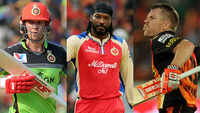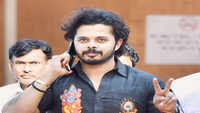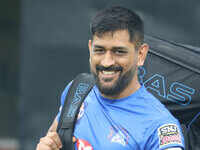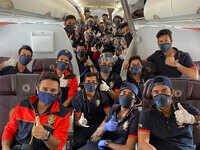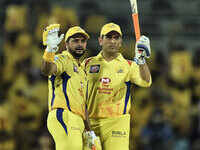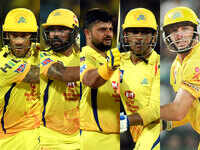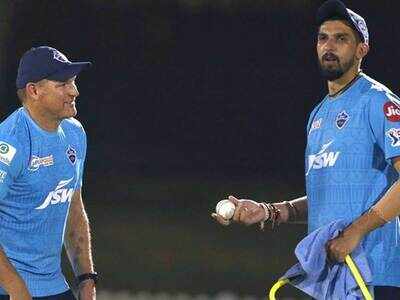
NEW DELHI: It was almost an eleventh-hour SOS. Former Australian medium pacer Ryan Harris received a message from Delhi Capitals' (DC) coach Ricky Ponting. At that moment, the premature end to his coaching contract with Kings XI Punjab (KXIP) had left him disappointed. But Harris's former captain and Australia teammate's message reignited the spark. Ponting roped in Harris as DC's bowling coach days before the start of 2020 season of the Indian Premier League (IPL) in the UAE.
It was a no-brainer for Harris to sign on the dotted line. He did that and soon got down to researching the squad Delhi had put together after the last IPL auction in December 2019.
Having experienced the IPL as a player and coach, both times for KXIP, Harris understands the challenges the world's most competitive T20 league throws up. But this season is going to be a lot different, thanks to the coronavirus pandemic and a foreign location.
IPL 2020: FULL LEAGUE-STAGE SCHEDULE
Being played in a biosecure bubble, there are restrictions on the movement of players while off the field. If that's not enough of a mental challenge to unwind, on the field there are limitations like no use of saliva to maintain the shine of the ball. While Harris thinks that may not be a big hurdle in the game's shortest format, maintaining a mental balance and positive frame of mind amid a restricted environment will have to be dealt with.
On a slightly unexpected note, Harris may not have thought of facing problems with players understanding instructions in English. The Aussie admitted that to be an issue with some players, but he is thankful to have veteran pacer Ishant Sharma around to help him tide over that.
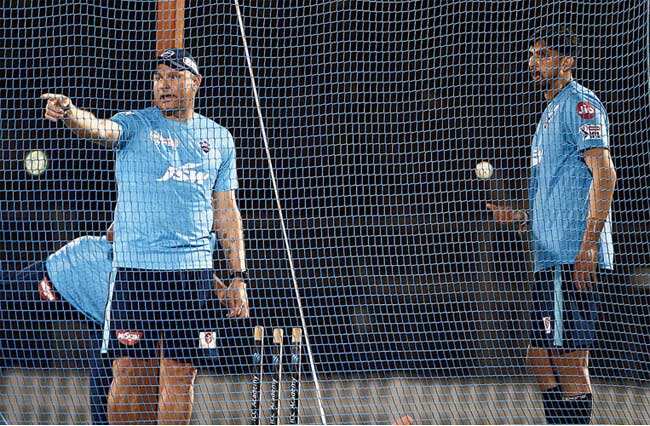 (Photo: DC)
(Photo: DC)
In Ishant, as Harris says in this interview with Timesofindia.com, the Australian has found the man who can not only relay or translate the exact instructions to the players, but also a natural leader of a bowling group that will have to counter the restrictions, slow pitches and the hot and humid weather in the Emirates, once the September 19 to November 10 IPL begins.
Excerpts...
You are the latest arrival in the DC set-up in terms of appointments. Was it a surprise or something that was in the works?
Very much, it absolutely surprised me. Obviously, I was still supposed to be at Kings XI because we had a two-year contract from last year. When that got sort of terminated, I was really disappointed because I saw that as a great opportunity to progress my coaching at the international level. So it was great to be able to be caught up late and coming to a franchise that I've always admired. Delhi is a big-name franchise. When Ricky texted me and asked if I was interested, I couldn't get back to him quick enough. I was so proud, so happy to have another opportunity in the IPL with Delhi and also to be with a good mate, Ricky Ponting, and have that opportunity to coach under him. Then I did some research on the squad being a part of what I think is a really, really exciting team. I am just so pumped and happy to be here.
Different will be an understatement considering the scenario in which cricket has resumed amid Covid-19. Being a bowling coach, what are your biggest challenges?
Keeping everyone safe and well, that's in general. For me it's, as always, just to make sure that guys are focused on the simple things, on simple plans. In T20 cricket, the game goes so fast that, I think, the most successful teams are the ones that are able to keep calm on the ground, especially as a bowling unit. If you are bowling good balls and getting hit, you've got to make sure you are clear with your plans and slow down rather than get back to your mark and bowl another ball. It's a challenge for every team. I think it's just to try and stay as calm as possible and letting the players know that and also just to have a nice, clear plan. The little amount of T20 cricket I have coached, that's the biggest challenge. So making sure the guys prepare well for that.
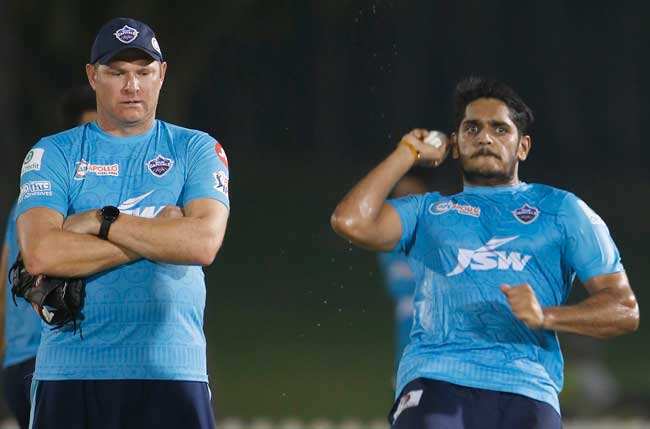 (Photo: DC)
(Photo: DC)
Is there a mandate that coach Pointing and the other Delhi think-tank members have given you?
Yes and no. What I've learned is to try and keep things as positive as possible. Bowlers, as all cricketers and batsmen, think about the game a lot and they take it to heart when they get hit. They don't like getting hit and going for runs, but that's just going to happen. What I learnt when I was playing is that it's very easy to focus on the negative and the result of what happens. I try and stay as positive as possible. Yes, we know we're going to get hit, but let's just try to limit that way of getting hit, and pass that (thought process) onto the bowlers and make sure they know that they're going to bowl good balls that's going to go for six. That's just the way the game is. So keep them in a good, positive frame of mind. I think as soon as you get into a negative frame of mind, it just gets worse. So positive coaching, positive reinforcement.
The restricted environment, slow pitches and altered rules, especially the ban on use of saliva to shine the ball - are they all a bigger challenge for the bowlers compared to the batsmen?
I don't think that (ban on use of saliva) makes too much of a difference in this format but definitely in the longer format. I think the things that happen to the ball in this sort of format is from the conditions and the ball getting hit into the stands or into the fence. That leaves marks on the ball. So I think that's what happens more to the ball in this format. The shine doesn't stay there for a long time. I think it's going to be different for guys not to do that (using saliva to shine the ball), and sweat is not allowed either. So yes, putting nothing on the ball, no matter what format you play, is going to be very different.
DC bowling has experience in the form of Ishant Sharma. How have you gone about the training methodology, in terms of maintaining balance and assigning leadership roles within the bowling group?
Exactly. I have spoken more to Ishant probably about that than the other Indian guys. There are guys who can understand English really well and some can't. Most of the guys here are pretty good but there's still one or two who sometimes might not quite get it across. So I've spoken to Ishant, for instance, to make sure that he can (translate) and he's doing it beautifully. I know Ishant and have met him a few times. He's someone I really trust and admire, not just for the way he plays cricket but also as a person. So I'm making sure that if I talk to one of the younger guys, he (Ishant) is around so that the player knows what I'm saying and he can relate to that as well to make sure that we are on the same page.
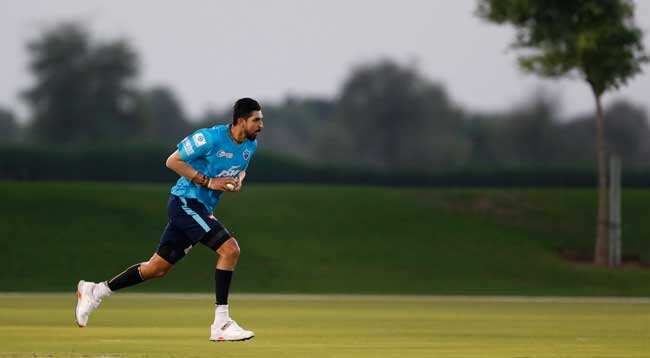 (Photo: DC)
(Photo: DC)
I've spoken to Ishant about being a leader. I don't have to do that because he knows that he naturally does that (lead the bowling unit) with the amount of cricket he has played. So having someone like him, an experienced guy who wants to talk cricket with me all the time and wants to learn from me and I still want to learn from him, that for me is a really good, positive relationship. So he's been excellent like that and you have to be during the whole IPL.
How big a help is it to have a head coach who was your teammate during your playing days?
I guess when you work with someone, you have got to trust them, and it makes things a lot easier. It's for me to trust him (Ponting), but also more importantly for him to trust me to know that I can do the role. I haven't worked with Ricky coaching-wise. Obviously he knew the way I played, he knew the passion I had, he knew that when I played, personally I wanted to do well but I also wanted the best for the team. He would have done some research on me in coaching, and he obviously saw that and heard that in me, so that's what I want. I want to do everything I can to make his job easier, but also to make sure that we're getting the best out of the team, not just the fast bowlers, I've got the spin bowlers as well and obviously talk to the batsmen a bit when I need to, and they come to me about stuff, which is great.
So it's just getting that all-round information and best for the team. So having that trust in me is obviously why he got me as well. I have seen Ricky on and off for the last few years but haven't spent a lot of time with him. I try and get as close as I can when he's talking to the batsmen. I feel like a bit of an eavesdropper. But I said to him a couple of days ago that "don't mind me, I'm just listening to know what you're saying", and he's fine (with that). So I'm here to learn a lot more from him as well. It's been good so far and there's obviously a bit more time to go yet, so it's gonna be good fun.
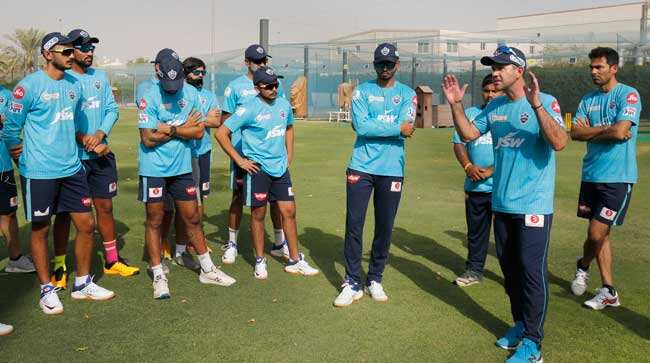 (Photo: DC)
(Photo: DC)
Apart from the fact that there are protocols and restrictions in the bio-bubble, how much of a challenge is it for the players to be physically restricted, which can have a mental impact as well? Plus the weather isn't the most pleasant...
It's a big challenge, and we've discussed a lot of that. Training-wise, I think they always look forward to training and it's the only time we can get out of the hotel, so they're obviously jumping on-board with that. But on the flip side of that, we've got to be really careful how much they train, as you said with the heat. We played a practice game the other night and it was ridiculously hot. I think it surprised some of the guys how hot and humid it was and how drained they were. So it's the balance. We've let the guys go pretty hard now, we've still got a few days until we play our first game. So coming closer to that, we'll start talking more about sort of quietening down a bit, refreshing up. But then that creates the challenge of not being able to get out of the hotel.
So we're trying to come up with things that we can do. We have had some team dinners, we've tried to organize some sort of activities. We're sitting in an activity room now with table tennis and stuff like that and a pool table. I think they're trying to work out competitions that they can make up. So it's really challenging, even for me. I play golf, I love getting out and exploring. It's really hard that we can't do that at the moment. So it's finding that balance. I think ultimately they (the players) know that they've got that challenge, and I guess each individual will deal with it the way they can.
It was a no-brainer for Harris to sign on the dotted line. He did that and soon got down to researching the squad Delhi had put together after the last IPL auction in December 2019.
Having experienced the IPL as a player and coach, both times for KXIP, Harris understands the challenges the world's most competitive T20 league throws up. But this season is going to be a lot different, thanks to the coronavirus pandemic and a foreign location.
IPL 2020: FULL LEAGUE-STAGE SCHEDULE
Being played in a biosecure bubble, there are restrictions on the movement of players while off the field. If that's not enough of a mental challenge to unwind, on the field there are limitations like no use of saliva to maintain the shine of the ball. While Harris thinks that may not be a big hurdle in the game's shortest format, maintaining a mental balance and positive frame of mind amid a restricted environment will have to be dealt with.
On a slightly unexpected note, Harris may not have thought of facing problems with players understanding instructions in English. The Aussie admitted that to be an issue with some players, but he is thankful to have veteran pacer Ishant Sharma around to help him tide over that.

In Ishant, as Harris says in this interview with Timesofindia.com, the Australian has found the man who can not only relay or translate the exact instructions to the players, but also a natural leader of a bowling group that will have to counter the restrictions, slow pitches and the hot and humid weather in the Emirates, once the September 19 to November 10 IPL begins.
Excerpts...
You are the latest arrival in the DC set-up in terms of appointments. Was it a surprise or something that was in the works?
Very much, it absolutely surprised me. Obviously, I was still supposed to be at Kings XI because we had a two-year contract from last year. When that got sort of terminated, I was really disappointed because I saw that as a great opportunity to progress my coaching at the international level. So it was great to be able to be caught up late and coming to a franchise that I've always admired. Delhi is a big-name franchise. When Ricky texted me and asked if I was interested, I couldn't get back to him quick enough. I was so proud, so happy to have another opportunity in the IPL with Delhi and also to be with a good mate, Ricky Ponting, and have that opportunity to coach under him. Then I did some research on the squad being a part of what I think is a really, really exciting team. I am just so pumped and happy to be here.
Different will be an understatement considering the scenario in which cricket has resumed amid Covid-19. Being a bowling coach, what are your biggest challenges?
Keeping everyone safe and well, that's in general. For me it's, as always, just to make sure that guys are focused on the simple things, on simple plans. In T20 cricket, the game goes so fast that, I think, the most successful teams are the ones that are able to keep calm on the ground, especially as a bowling unit. If you are bowling good balls and getting hit, you've got to make sure you are clear with your plans and slow down rather than get back to your mark and bowl another ball. It's a challenge for every team. I think it's just to try and stay as calm as possible and letting the players know that and also just to have a nice, clear plan. The little amount of T20 cricket I have coached, that's the biggest challenge. So making sure the guys prepare well for that.

Is there a mandate that coach Pointing and the other Delhi think-tank members have given you?
Yes and no. What I've learned is to try and keep things as positive as possible. Bowlers, as all cricketers and batsmen, think about the game a lot and they take it to heart when they get hit. They don't like getting hit and going for runs, but that's just going to happen. What I learnt when I was playing is that it's very easy to focus on the negative and the result of what happens. I try and stay as positive as possible. Yes, we know we're going to get hit, but let's just try to limit that way of getting hit, and pass that (thought process) onto the bowlers and make sure they know that they're going to bowl good balls that's going to go for six. That's just the way the game is. So keep them in a good, positive frame of mind. I think as soon as you get into a negative frame of mind, it just gets worse. So positive coaching, positive reinforcement.
The restricted environment, slow pitches and altered rules, especially the ban on use of saliva to shine the ball - are they all a bigger challenge for the bowlers compared to the batsmen?
I don't think that (ban on use of saliva) makes too much of a difference in this format but definitely in the longer format. I think the things that happen to the ball in this sort of format is from the conditions and the ball getting hit into the stands or into the fence. That leaves marks on the ball. So I think that's what happens more to the ball in this format. The shine doesn't stay there for a long time. I think it's going to be different for guys not to do that (using saliva to shine the ball), and sweat is not allowed either. So yes, putting nothing on the ball, no matter what format you play, is going to be very different.
DC bowling has experience in the form of Ishant Sharma. How have you gone about the training methodology, in terms of maintaining balance and assigning leadership roles within the bowling group?
Exactly. I have spoken more to Ishant probably about that than the other Indian guys. There are guys who can understand English really well and some can't. Most of the guys here are pretty good but there's still one or two who sometimes might not quite get it across. So I've spoken to Ishant, for instance, to make sure that he can (translate) and he's doing it beautifully. I know Ishant and have met him a few times. He's someone I really trust and admire, not just for the way he plays cricket but also as a person. So I'm making sure that if I talk to one of the younger guys, he (Ishant) is around so that the player knows what I'm saying and he can relate to that as well to make sure that we are on the same page.

I've spoken to Ishant about being a leader. I don't have to do that because he knows that he naturally does that (lead the bowling unit) with the amount of cricket he has played. So having someone like him, an experienced guy who wants to talk cricket with me all the time and wants to learn from me and I still want to learn from him, that for me is a really good, positive relationship. So he's been excellent like that and you have to be during the whole IPL.
How big a help is it to have a head coach who was your teammate during your playing days?
I guess when you work with someone, you have got to trust them, and it makes things a lot easier. It's for me to trust him (Ponting), but also more importantly for him to trust me to know that I can do the role. I haven't worked with Ricky coaching-wise. Obviously he knew the way I played, he knew the passion I had, he knew that when I played, personally I wanted to do well but I also wanted the best for the team. He would have done some research on me in coaching, and he obviously saw that and heard that in me, so that's what I want. I want to do everything I can to make his job easier, but also to make sure that we're getting the best out of the team, not just the fast bowlers, I've got the spin bowlers as well and obviously talk to the batsmen a bit when I need to, and they come to me about stuff, which is great.
So it's just getting that all-round information and best for the team. So having that trust in me is obviously why he got me as well. I have seen Ricky on and off for the last few years but haven't spent a lot of time with him. I try and get as close as I can when he's talking to the batsmen. I feel like a bit of an eavesdropper. But I said to him a couple of days ago that "don't mind me, I'm just listening to know what you're saying", and he's fine (with that). So I'm here to learn a lot more from him as well. It's been good so far and there's obviously a bit more time to go yet, so it's gonna be good fun.

Apart from the fact that there are protocols and restrictions in the bio-bubble, how much of a challenge is it for the players to be physically restricted, which can have a mental impact as well? Plus the weather isn't the most pleasant...
It's a big challenge, and we've discussed a lot of that. Training-wise, I think they always look forward to training and it's the only time we can get out of the hotel, so they're obviously jumping on-board with that. But on the flip side of that, we've got to be really careful how much they train, as you said with the heat. We played a practice game the other night and it was ridiculously hot. I think it surprised some of the guys how hot and humid it was and how drained they were. So it's the balance. We've let the guys go pretty hard now, we've still got a few days until we play our first game. So coming closer to that, we'll start talking more about sort of quietening down a bit, refreshing up. But then that creates the challenge of not being able to get out of the hotel.
So we're trying to come up with things that we can do. We have had some team dinners, we've tried to organize some sort of activities. We're sitting in an activity room now with table tennis and stuff like that and a pool table. I think they're trying to work out competitions that they can make up. So it's really challenging, even for me. I play golf, I love getting out and exploring. It's really hard that we can't do that at the moment. So it's finding that balance. I think ultimately they (the players) know that they've got that challenge, and I guess each individual will deal with it the way they can.
Download
The Times of India News App for Latest Sports News

Coronavirus outbreak
Trending Topics
LATEST SPORTS VIDEOS
More from TOI
Navbharat Times
Featured Today in Travel
Quick Links
DC Players 2020KXIP player list 2020RCB 2020 IPL teamSRH Players list 2020CSK Players list 2020IPL 2020 Players ListIPL 2020 Time TableIPL 2020 Points TableUpcoming Cricket ScheduleCricket Match resultsMI Players list 2020IPL 2020 ScheduleRajasthan Royals team 2020KKR squad 2020WWE Raw resultsTennis newsHockey newsFootball newsCricket ScoreBCCI
Get the app
